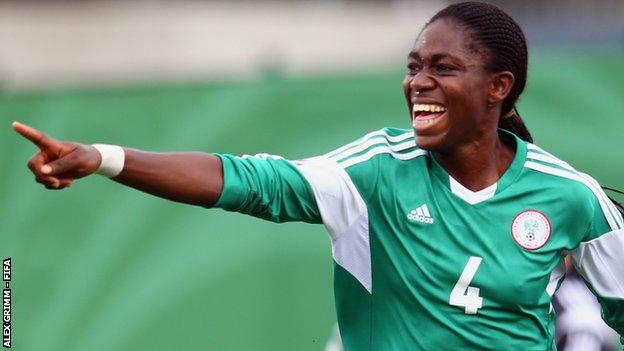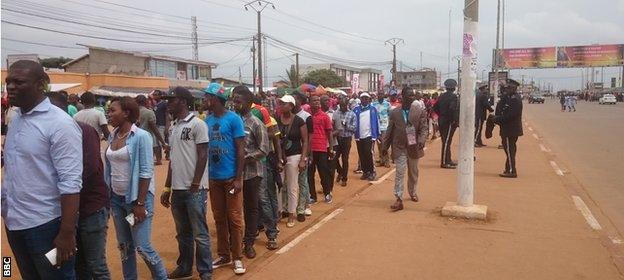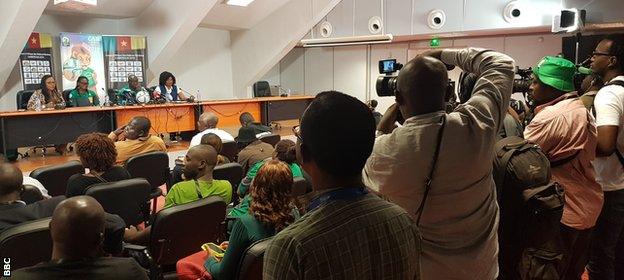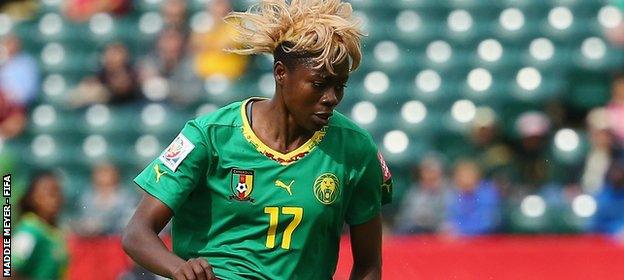Cup of Nations final: Can Cameroon beat Nigeria to end long wait for title?
- Published

Asisat Oshoala has scored six goals in four games for Nigeria
Nigeria have had an almost vice-like grip on the Women's Africa Cup of Nations but will face determined hosts Cameroon in Saturday's final.
BBC Sport takes a closer look at the biennial tournament and tackles some key questions for the game in Africa.
What is the Women's Africa Cup of Nations?
The top tournament for international women's football in Africa, it was first held in 1991, when teams competed for the trophy over several months. It was the same format in 1995.
Since 1998, however, it has been held as a tournament every two years, with eight teams taking part. Cameroon is hosting this one, the 10th edition.
Teams are divided into two groups of four, with the top two sides advancing straight to the semi-finals.
Cameroon, who have never won the competition, qualified as hosts and were joined by Nigeria, Ghana, South Africa, Zimbabwe, Egypt, debutants Kenya and Mali, who replaced Equatorial Guinea after they were disqualified for fielding a player using fraudulent documents.
Nigeria are the continent's dominant force. Only one other nation, Equatorial Guinea, has won this tournament, coming out on top in both 2008 and 2012.
How has the 2016 event gone?
The tournament is being staged in Yaounde, Cameroon's capital city, and Limbe, in the west of the country.
The locals have embraced it, with tickets priced competitively between 1,000 and 5,000 Central African Francs (£1.30 to £6.45).

Cameroon will also host the men's Africa Cup of Nations in 2019
Stade Ahmadou Ahidjo in Yaounde has sold out and will be cacophonous, thanks to the vuvuzelas, beating drums, screeching whistles, cheers of the crowd and the sound of seats shuffling from the many Mexican Waves.
Helen Mgoh, a local journalist working for National radio broadcaster CRTV, says Cameroonians have been "clamouring for some good football" because the men have been performing poorly for a long time.
"These women have been putting the action out there on the turf and we're just loving it," adds Ngoh.
It's a sentiment echoed by Cameroon's assistant coach and former captain Bernadette Anong, who says she has never experienced an atmosphere like it.
Even the stadium in Limbe has been close to full for the the likes of Nigeria and Egypt, who are making only their second appearance at the tournament.
"I never imagined people would be that interested in women's football," says Egypt player Esraa Osama.
"I have been playing professionally for 14 years and it's the first time I felt what a male footballer must feel - and it is thanks to the fans."
Has it advanced the women's game in Africa?
Enow Ngachu, one of the longest-serving coaches of women's football in Africa, has been in charge of Cameroon since 2004, guiding them to their first Olympic Games in 2012 and first World Cup in 2015.
He believes the standard of female football has "increased a lot" in Africa.
At his team's press conference ahead of the final, he was also quick to comment on the packed press room, a sight he reckoned he had never experienced in African women's football before.

Enow Ngachu: "Our target was to win five matches. We have won four so far."
Kenya may have lost all three group games in their first Nations Cup but their coach insists it has been a positive experience for his players.
"When they go home, they will know what level they need to push their club team-mates to reach," says David Ouma.
But it is what happens after the tournament that is crucial for the development of women's football in Africa.
Players like South Africa's Janine Van Wyk have already appealed for more international matches because African teams struggle to get games against the world's top sides outside of the major events.
In fact, 14 of the 40 women's teams in Africa have not played enough international matches to even qualify for a Fifa ranking.
Domestic leagues, even in the strongholds of Nigeria and Cameroon, are often fractured or suspended, too, while lack the financial support from football associations and sponsors is also a hindrance.
So who is contesting the final?
Nigeria, or the Super Falcons, face Cameroon, also known as the Indomitable Lionesses, on Saturday in Yaounde (14:30 BST) in a repeat of the 2014 final in Namibia, which the Nigerians won 2-0.
Cameroon have yet to win the tournament but their defence has been rock solid in this edition and they've yet to concede a goal. Scoring has been trickier, though. Despite dominating games, their finishing has been poor.
Their big star is 24-year-old striker Gaelle Enganamouit. Her face adorns many billboards but the 2016 BBC Women's Footballer of the Year nominee is just back from a lengthy injury and has yet to find the net in this tournament.

Gaelle Enganamouit was nicknamed the 'Freight Train' during the 2015 World Cup
"She's had so much pressure on her," says Ngoh. "She really wants to score and when she doesn't you can see her frustration. She knows the public are willing her to score. When it doesn't happen, it adds to the pressure."
Nigeria are the favourites on Saturday and, despite facing a very vocal home crowd, their coach and former captain Florence Omagbemi is in upbeat mood.
"Mentally, physically, psychologically, we are ready for the game on Saturday," she says. "We have experienced players that can deal with any situation."
Omagbemi has reason to be confident. Her team are the top scorers, with Arsenal's Asisat Oshoala claiming six of their 12 goals.
----------------
Nigeria's path to the final:
Group games: Beat Mali 6-1; Drew 1-1 with Ghana; Beat Kenya 4-0.
Semi-final: Beat South Africa 1-0.
Cameroon's path to the final:
Group games: Beat Egypt 2-0; Beat South Africa 1-0; Beat Zimbabwe 2-0.
Semi-final: Beat Ghana 1-0.
----------------
Journalist Mimi Fawaz, who follows Nigeria for Africa Vox TV, expects Cameroon to target Oshoala to stop her finding the net but says the team have other threats, like Ucheci Sunday, Desire Oparanozie and Francisca Ordega.
"They used the long ball effectively against South Africa in their semi-final and they could use this again on Saturday," adds Fawaz.
Nigeria have never lost in the final of the Nations Cup, claiming seven wins in nine tournaments. Two other titles came their way when the competition was played over a calendar year rather than a two-week event.
For Cameroon, Saturday might feel like deja vu. They have lost three times in the final - with all those defeats coming at the hands of Nigeria.
There will be updates from Sarah and the World Service team from 15:00 BST.